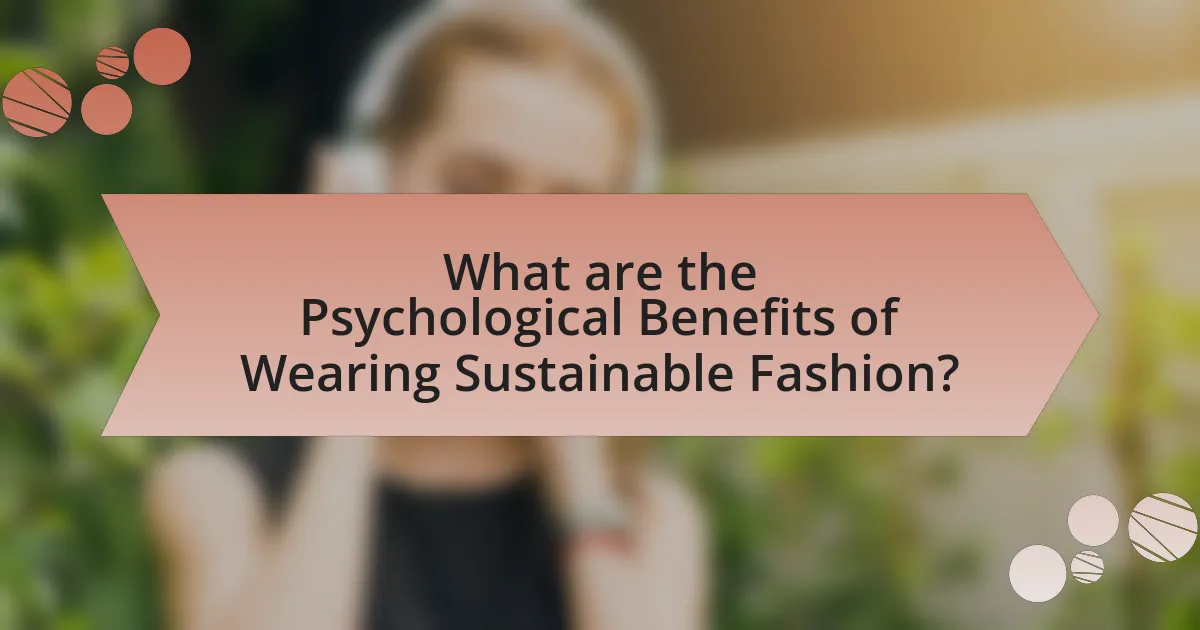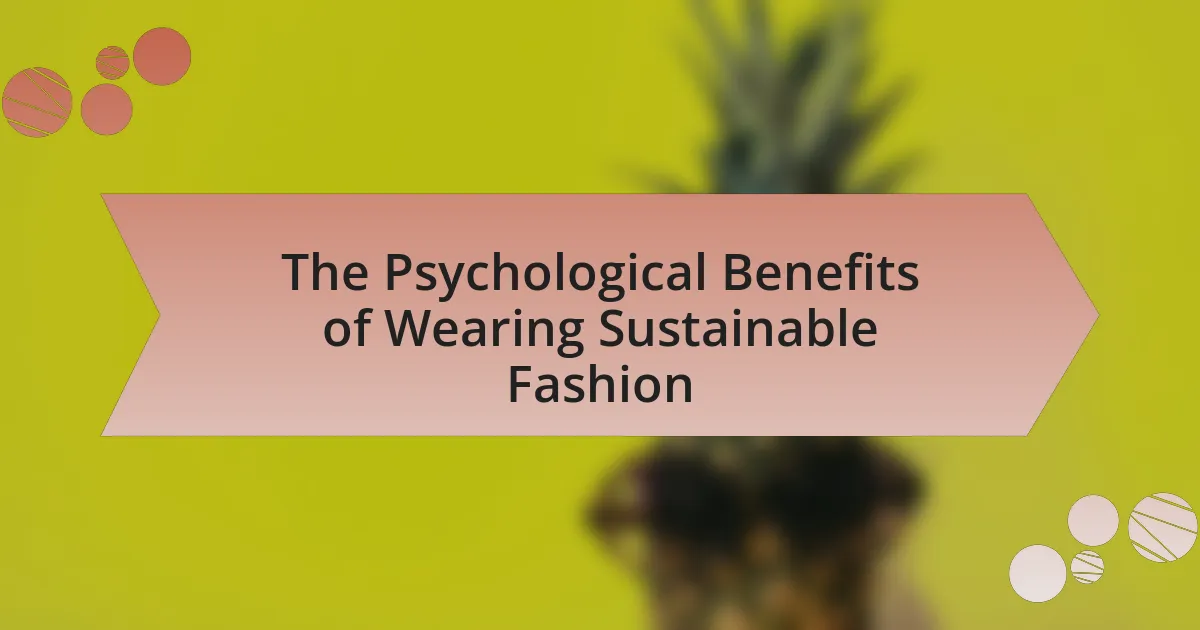The article explores the psychological benefits of wearing sustainable fashion, highlighting how ethical clothing choices can enhance self-esteem, foster a sense of purpose, and improve mental well-being. It discusses the positive impacts of sustainable fashion on personal identity, community connection, and overall life satisfaction, supported by research findings. Additionally, the article addresses potential drawbacks, such as eco-anxiety and financial stress, while offering practical steps for individuals to embrace sustainable fashion for improved psychological health. Overall, it emphasizes the alignment of personal values with consumer choices as a key factor in enhancing emotional well-being.

What are the Psychological Benefits of Wearing Sustainable Fashion?
Wearing sustainable fashion provides psychological benefits such as increased self-esteem and a sense of purpose. Individuals often feel more confident and empowered when they know their clothing choices contribute positively to the environment and society. Research indicates that consumers who engage in sustainable practices report higher levels of happiness and life satisfaction, as they align their values with their purchasing decisions. A study published in the Journal of Consumer Research found that ethical consumption can enhance personal identity and foster a sense of community among like-minded individuals, further reinforcing the psychological advantages of choosing sustainable fashion.
How does wearing sustainable fashion impact mental well-being?
Wearing sustainable fashion positively impacts mental well-being by fostering a sense of purpose and alignment with personal values. Individuals who choose sustainable clothing often report increased feelings of satisfaction and happiness, as they contribute to environmental preservation and ethical labor practices. Research published in the Journal of Consumer Research indicates that consumers who engage in sustainable practices experience enhanced self-esteem and a stronger sense of identity, which are crucial components of mental health. This connection between sustainable fashion and mental well-being is further supported by studies showing that ethical consumption can lead to reduced anxiety and improved overall life satisfaction.
What specific psychological effects are associated with sustainable fashion choices?
Sustainable fashion choices are associated with several specific psychological effects, including enhanced self-esteem, increased feelings of empowerment, and reduced anxiety related to environmental concerns. Individuals who engage in sustainable fashion often report a sense of and fulfillment from making ethical choices, which can boost their self-image. Research indicates that consumers who prioritize sustainability in their clothing choices experience a greater sense of agency and responsibility, leading to improved mental well-being. Furthermore, studies show that awareness of the positive environmental impact of their choices can alleviate feelings of eco-anxiety, contributing to overall psychological resilience.
How does sustainable fashion influence self-esteem and body image?
Sustainable fashion positively influences self-esteem and body image by promoting a sense of authenticity and social responsibility. When individuals wear sustainable clothing, they often feel aligned with their values, which can enhance their self-worth and confidence. Research indicates that consumers who engage in ethical fashion practices report higher levels of satisfaction with their appearance and self-image, as they perceive their choices as contributing to a greater good. A study published in the Journal of Fashion Marketing and Management found that individuals who prioritize sustainability in their wardrobe are more likely to experience positive body image, as they focus on the quality and fit of clothing rather than conforming to fast fashion trends. This shift in mindset fosters a healthier relationship with one’s body and promotes self-acceptance.
Why do consumers feel a sense of fulfillment from sustainable fashion?
Consumers feel a sense of fulfillment from sustainable fashion because it aligns their purchasing choices with their values of environmental responsibility and ethical consumption. This alignment fosters a positive self-identity and enhances their emotional well-being. Research indicates that individuals who engage in sustainable practices report higher levels of life satisfaction and happiness, as they perceive their actions as contributing to a greater good. For instance, a study published in the Journal of Consumer Research found that consumers who buy sustainable products often feel a sense of and accomplishment, reinforcing their commitment to sustainability and creating a cycle of positive reinforcement.
What role does ethical consumption play in personal satisfaction?
Ethical consumption significantly enhances personal satisfaction by aligning individual purchasing decisions with personal values and beliefs. When consumers choose sustainable and ethically produced goods, they often experience a sense of fulfillment and , knowing their choices contribute positively to society and the environment. Research indicates that individuals who engage in ethical consumption report higher levels of happiness and well-being, as their actions reflect their moral convictions. For instance, a study published in the Journal of Consumer Research found that consumers who prioritize ethical considerations in their purchases experience increased life satisfaction and a stronger sense of identity. This connection between ethical consumption and personal satisfaction underscores the psychological benefits associated with making conscientious choices in fashion and other consumer goods.
How does contributing to environmental sustainability enhance personal happiness?
Contributing to environmental sustainability enhances personal happiness by fostering a sense of purpose and community connection. Engaging in sustainable practices, such as supporting eco-friendly fashion, allows individuals to align their values with their actions, leading to increased life satisfaction. Research indicates that people who actively participate in sustainability initiatives report higher levels of well-being; for instance, a study published in the Journal of Environmental Psychology found that individuals who engage in pro-environmental behaviors experience greater happiness due to feelings of accomplishment and social belonging. This connection to a larger cause not only boosts self-esteem but also cultivates positive relationships with like-minded individuals, further enhancing overall happiness.
What social benefits arise from wearing sustainable fashion?
Wearing sustainable fashion fosters social benefits such as enhanced community engagement and support for ethical labor practices. By choosing sustainable brands, consumers contribute to a market that prioritizes fair wages and safe working conditions for garment workers, which can lead to improved livelihoods in developing regions. Additionally, sustainable fashion promotes awareness of environmental issues and encourages collective action towards sustainability, fostering a sense of community among like-minded individuals. This collective consciousness can strengthen social ties and create a culture of responsibility and care for both people and the planet.
How does sustainable fashion foster community and connection?
Sustainable fashion fosters community and connection by promoting shared values and collaborative practices among consumers and producers. This approach encourages individuals to engage in local initiatives, such as clothing swaps and community workshops, which strengthen social ties and create a sense of belonging. Research indicates that participation in sustainable fashion activities can enhance social interactions and support networks, leading to increased community cohesion. For instance, a study published in the Journal of Consumer Culture highlights how sustainable fashion initiatives often involve collective efforts that unite people around common environmental and ethical goals, thereby reinforcing community bonds.
What impact does sustainable fashion have on social identity and belonging?
Sustainable fashion significantly enhances social identity and belonging by fostering a sense of community among individuals who prioritize ethical consumption. This collective identity is often reinforced through shared values of environmental responsibility and social justice, which are central to sustainable fashion. Research indicates that consumers who engage with sustainable fashion brands often report feeling a stronger connection to like-minded individuals, thereby enhancing their social networks and sense of belonging. For instance, a study published in the Journal of Consumer Research found that individuals who adopt sustainable practices in their clothing choices are more likely to identify with groups that value sustainability, leading to increased social cohesion and support within those communities.
How can the psychological benefits of sustainable fashion be measured?
The psychological benefits of sustainable fashion can be measured through various quantitative and qualitative research methods. Surveys and questionnaires can assess consumer attitudes, self-reported happiness, and satisfaction levels associated with purchasing sustainable clothing. For instance, a study published in the Journal of Fashion Marketing and Management found that consumers who engage in sustainable fashion practices report higher levels of self-esteem and well-being. Additionally, psychological scales, such as the Positive and Negative Affect Schedule (PANAS), can be utilized to evaluate emotional responses linked to sustainable fashion choices. These methods provide concrete data that demonstrate the positive psychological impacts of sustainable fashion on individuals.
What are the potential drawbacks of sustainable fashion on mental health?
Sustainable fashion can negatively impact mental health by creating feelings of guilt and anxiety related to consumer choices. Individuals may experience stress from the pressure to make environmentally friendly decisions, leading to a sense of inadequacy if they feel they cannot fully commit to sustainable practices. Research indicates that the constant awareness of environmental issues can contribute to eco-anxiety, a condition characterized by chronic fear of environmental doom, which can exacerbate mental health issues. Additionally, the high cost of sustainable clothing can lead to financial stress, further impacting mental well-being.
What practical steps can individuals take to embrace sustainable fashion for psychological benefits?
Individuals can embrace sustainable fashion for psychological benefits by choosing to buy second-hand clothing, which fosters a sense of uniqueness and personal style while reducing waste. Engaging in this practice not only promotes environmental consciousness but also enhances self-esteem through the discovery of distinctive pieces that reflect individual identity. Research indicates that wearing clothing that aligns with personal values, such as sustainability, can lead to increased happiness and satisfaction. A study published in the Journal of Consumer Research found that consumers who prioritize ethical consumption report higher levels of well-being and life satisfaction. Additionally, participating in clothing swaps or upcycling projects can create a sense of community and belonging, further contributing to positive mental health outcomes.
